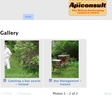| 2011 Maritime Bee Tour – You’re Invited! Posted: 29 Jun 2011 09:40 AM PDT Every summer, beekeepers in our region look forward to the "Bee Tour" of the Maritimes Beekeepers Association. Well, it's that time again – and you're invited on the 2011 Maritime Bee Tour, hosted by the Nova Scotia Beekeepers Association! 

 |
| SENB Beekeepers’ Field Day 18 June 2011 Posted: 15 Jun 2011 10:43 AM PDT Southeast New Brunswick Beekeeper’s Association will be holding a field day on Saturday, 18 June 2011 — rain or shine. Registration and coffee will be at 9:30 a.m. at the Salisbury Baptist Church, Main Street, Salisbury, New Brunswick. If weather permits, the afternoon session will take place at the Country Fields/ Dore Honey apiary in [...] 

 |
| Four New Viruses Found in US Honey Bees Posted: 09 Jun 2011 09:22 AM PDT What viruses and bacteria exist in a normal honey bee colony throughout the year? A new study by UCSF researchers followed 20 colonies in a commercial beekeeping operation of more than 70,000 hives as they were transported across United States for crop pollination. 

 |
| Honey Fights Bacteria in Wounds, Scientists Say Posted: 09 May 2011 08:46 PM PDT Some 2000 years before the discovery of the existence of bacteria, honey was used to treat infected wounds. With the advent of modern medicine, such "folk remedies" as honey for wound treatment have gone out of favour, but in recent years honey has started to get more attention. Now, another study lends further credence to [...] 

 |
| Beekeeper Responds to Health Canada “Anti-Honey Campaign” Posted: 17 Mar 2011 10:11 AM PDT In this submitted article, New Brunswick beekeeper Richard Duplain responds to recent warnings from Health Canada about infant botulism as an effect of toxins in honey, as well as an implied connection between honey and allergies due to pollen. Health Canada advises against using Honey Letter to the Editor or Commentary Recently Health Canada embarked [...] 

 |
| From Chemicals to Air Pollution, New Report Points to Multiple Threats to Bees Posted: 10 Mar 2011 07:49 AM PST More than a dozen factors, ranging from declines in flowering plants and the use of memory-damaging insecticides to the world-wide spread of pests and air pollution, may be behind the emerging decline of bee colonies across many parts of the globe. Scientists are warning that without profound changes to the way human-beings manage the planet, [...] 

 |
| NB Agriculture Website is Updated, Better for Beekeepers Posted: 17 Dec 2010 10:10 AM PST The New Brunswick Department of Agriculture, Aquaculture and Fisheries has launched a major update to its website. Beyond a clean new look, the revised website makes it easier to find information published by the department, including forms and regulations. For beekeepers, there is a separate page all about bees, which serves as a “one-stop shop” [...] 

 |
| Free Honey and Pollen Analysis Offered to Canadian Beekeepers Posted: 09 Nov 2010 04:57 AM PST A two-year research project entitled Floral identification of Canadian honey and pollen and development of a palynological reference booklet aims to develop a Canadian expertise in honey and pollen identification. Unlike European honeys, Canadian honeys are not differentiated by their specific floral sources. The term "mixed flowers" categorizes the majority of honey sold in the [...] 

 |
| Varroa Mites Blamed for Winter Bee Losses in Canada Posted: 08 Nov 2010 07:58 AM PST Here's a good reason for beekeepers to treat all bee colonies for mites, whether or not you've seen visible evidence of infestation: "Varroa destructor is the main culprit for the death and reduced populations of overwintered honey bee (Apis mellifera) colonies in Ontario, Canada," says a report from the University of Guelph and Universidad Nacional [...] 

 |
| PEI Honey Product Wins Prestigious Prize Posted: 21 Oct 2010 07:39 PM PDT Central Beekeepers Alliance sends its hearty congratulations to Island Abbey Foods Ltd. of Prince Edward Island. The company just won the Global SIAL d'Or, one of the world's top food prizes, for its innovative Honibe Honey Drop, a dried honey product in the form of a lozenge, used to sweeten a hot beverage with honey [...] 

 |
| Bees trained to give early warning of plant disease Posted: 14 Jul 2010 06:06 PM PDT Remember, back in school, hearing about Pavlov’s dog that learned to drool when it heard a bell ring? That method of “classical conditioning” is how Dr. Andrew Sutherland, a researcher with the University of California Davis Plant Pathology Department, is training honey bees to detect plant disease in agricultural crops. Here’s the story, straight from [...] 

 |












